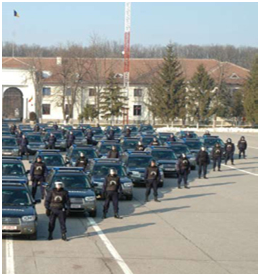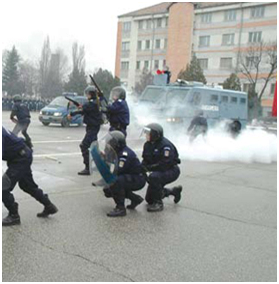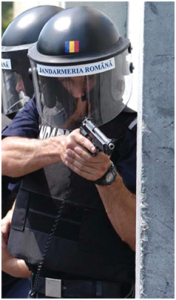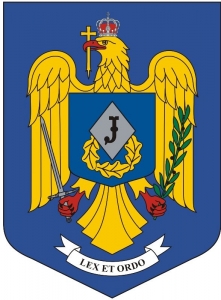The Romanian Gendarmerie was founded on the 3rd of April 1850, when the ruler Grigore Alexandru Ghica, approved the decision of People Assembly and promulgated “The Rule for Reform of the Corps Servants in Gendarmes”.
This law granted the Gendarmerie a legal status and established the principles of organizing and functioning.
The law stated that the Gendarmes Regiment of Moldavia would split into 2 two structures, each one having 6 counties as area of responsibility. Each county had 1 Company of gendarmes and there were 2 more companies to the police and the authorities of Iasi City. These 14 companies consisted of 1433 mounted and dismounted gendarmes. This law also established the following attributions:
surveillance of the public safety, maintaining order and law enforcement.
Then under The Law for Organizing of Military Forces from November 1864, the Gendarmerie is organized on new principles and put under the direct command of the Ministry of War, ceasing to be subordinated to the Ministry of Interior. The Law of Gendarmerie from 1850 and The City Gendarmes Regulations have been the main documents for organizing and functioning of the Gendarmerie and also, the base of the new law and regulations.
Thus, a first attempt was made in 1885, when Gl. Radu Mihail, the Chief of Bucharest Police, elaborated a project of law of Gendarmerie, but it wasn’t adopted.
Two years later, during the debates on the “Rural Law”, I.C. Bratianu said: “The Rural Gendarmerie will be better than the Rural Police that we’ve had so far! The Article no. 82 of this law was mentioning the organization of the Rural Gendarmerie on the base of a special law, but the lack of the financial resources delayed the project until 1893.
At September the 1st 1893, also the Regulations for the Implementation of the Law of Rural Gendarmerie were issued. The most important provision of this document was the following: ” The organization of Gendarmerie, as stipulated in the law, makes this institution a military body at the Ministry of Interior’s disposal, for ensuring public order and safety. It is also under the command of the Ministry of Justice concerning the police attributions and the Ministry of War for issues concerning the discipline, command ship and military training of the troops”
 “Art.6 The Gendarmerie Corps is an integrate part of the army, and has to obey the provisions of the general laws and regulations.
“Art.6 The Gendarmerie Corps is an integrate part of the army, and has to obey the provisions of the general laws and regulations.
Art. 7 The officer of the Gendarmerie Corps are recruited from any specialization of the army. The transfer of the officer from the army in the Gendarmerie is made by a High Decree, on the base of the report of the Ministry of Interior, at the recommendation of the Ministry of War.”
During the military maneuvers the Rural Gendarmerie accomplished Military Police tasks, made the necessary requisitions, and functioned as a Military Police. During all exercises and maneuvers the gendarmes units were considered components of the regular army having the same rights as the military units and subunits.
At 23rd of April 1929, the Parliament set the bases of a new modern and complete law of Rural Gendarmerie. In the same year The Rural Gendarmerie Status is promulgated by under aged King Mihai I.
This status granted stability, promotion, salaries and other wages, retirement pensions, conditions for marriage, rewards, etc.
In July, the 12th , 1940, King Carol II unifies The General Directorate of Police, Bucharest City Police and Gendarmerie Corps. Later, in September the 12th 1940 General Ion Antonescure-enforced the 1929′s legislation.
The most important law was Law no 264 from April the 22nd 1943 for organizing and functioning of Gendarmerie. According to this law, the Gendarmerie was a military structure, trained to ensure military and general police assignments. It was also very important the provision that stated that the Gendarmerie belonged to the Ministry of Defense and was at Ministry of Interior disposal only concerning its police attributions.
The transformation process of Romanian society marked by December 1989 Revolution and re-setting of democratic institutions have decisively contributed to reformation of Gendarmerie and elaboration of a new concept concerning the position and the role of public order forces at the end of 20th and the beginning of the 21st century.
 According to the Government Decision no. 0749, from July the 5th 1990, concerning increasing the action ability and enhancing the structure of the Ministry of Interior, The Guard and Order Troops HQ, changed in Gendarme Troops HQ. Afterwards, the Law no 40 in December the 18th 1990 granted legal status to the structure and the attributions of Gendarmes troops, trained to enforce the law, to observe and report to higher structures about situations that can threaten public safety and order in case of internal disorder and act to restore order.
According to the Government Decision no. 0749, from July the 5th 1990, concerning increasing the action ability and enhancing the structure of the Ministry of Interior, The Guard and Order Troops HQ, changed in Gendarme Troops HQ. Afterwards, the Law no 40 in December the 18th 1990 granted legal status to the structure and the attributions of Gendarmes troops, trained to enforce the law, to observe and report to higher structures about situations that can threaten public safety and order in case of internal disorder and act to restore order.
The Law 116/1998, concerning organizing and functioning of Romanian Gendarmerie was an important moment in the process of reconstruction of democratic Romania. The act may be considered as a decisive moment in the process of reformation of our institution and stabilization of Romania, on its democratic course.
In 2002, Romanian Gendarmerie is accepted as member of European and Mediterranean Polices and Gendarmeries Association (F.I.E.P.) concurrently, missions accomplished abroad are the best prove of Romanian gendarmes’ professionalism, as they are trained and educated to provide, ensure and defend order and democratic values.
On the 13th of March 2005 a new Law of Gendarmerie came into force, describing the current missions and structure.
Dependency and Area of responsibility
Romanian Gendarmerie is State’s specialized institution, with military status, within the Ministry of Internal Affairs which, according to the law, exercises its attributions on protection of public order and safety, citizens’ rights and fundamental liberties, public and private property, crime prevention and detection and other infringements of laws into force, as well as protection of State’s fundamental institutions and countering of terrorist acts.
Romanian Gendarmerie has full competence for performing its tasks on the entire Romanian national territory.
Concurrently, special judiciary competencies are given to Romanian Gendarmerie in tourist resorts and mountain areas.
Missions
- Art.19 of the Romanian Gendarmerie Organic Law states that Romanian Gendarmerie, through its specialized structures has the following attributions:
- By means and methods provided by the law, it protects life, corporal integrity and freedom of persons, public and private property, citizens, community and State legitimate interests;
- It performs missions of ensuring public order during meetings, marches, demonstrations, processions, strike pickets, promotional and commercial activities, cultural-artistic, sports, religious, memorial activities and also other similar activities carried out in public areas and involving people crowds;
- It performs missions in order to re-establish the public order when it has been disturbed by any kind of actions and deeds against the law into force;
- At General Inspectorate of Border Police request, on the basis of the co-operation plans, it performs assurance and re-establishment of public order missions at State cross-border checking points;
- On the basis of the co-operation plans, approved by the minister of administration and interior, it performs missions in order to maintain public order to prevent and detect crimes within mountain resorts and tourist routes, as well as on the Black Sea coast, in the Danube Delta, in resorts or in other operational interest areas;
- In co-operation with the State competent institutions, it performs missions to maintain public order during the official visits or during other activities to which Romanian or foreign high officials take part, on Romanian territory, in the objectives area and in the places where the activities are carried out;
- At the competent authorities request, it performs hot pursuit missions for fugitives, deserters and other persons of whom there is information and data that they are intending to perpetrate or have perpetrated crimes, persons who run away from preventive custody or from prison punishments;
- It participates in anti-terrorist intervention missions in the objectives under the Gendarmerie responsibility or in missions for capturing and neutralizing persons using fire arms or other means that put into danger the safety of persons, goods, values and special transports;
- According to the law, it ensures the guard and protection of the objectives, goods and other valuable assets established by Government Decision and also of MoAI objectives, established by order of the minister of administration and interior;
- According to the law, it ensures the guard and protection of certain important values transport, as well as fire arms, ammunition, explosive materials, drugs, toxic, radioactive and other dangerous substances transport, defined by law;
- In co-operation with the other State competence institutions, it participates in preventing and neutralizing terrorist acts missions on the Romanian territory;
- Together with other State competent institutions, it participate in surveillance, control and protection assurance of the wild animals fit for hunting and natural fishing funds, the forest and environment protection fund by specific measures of preventing and countering any infringements of the legal provisions
 It participates in classified mail protection during its transportation on the entire Romanian territory
It participates in classified mail protection during its transportation on the entire Romanian territory- It participates in limiting and eliminating the natural, technological, environmental or complex disaster consequences;
- According to the law, it participates in missions outside the Romanian territory with its own staff and technique, in training activities, in setting up of international forces for performing certain missions within the conflict and managing crisis situations preventing missions; it also participates in increasing-counseling, assistance, training, control activities of the local order forces or of these forces substitution on their domains of activity. During the performance of these missions, the participating Gendarmerie staff benefits from rights provided by law for the military personnel performing missions abroad;
- Ensures the measures for order and protection of the areas where there were produced or exists the danger of breaking out fires, explosions or some other emergency situations which can threat life, physical integrity of individuals or their goods,
- Detect contraventions and applies sanctions, according to the law,
- Elaborates, according to the law, the necessary documents for the beginning of the judicial procedure for the offences detected during the specific missions in accordance with the provisions of art. 214 of the Criminal Procedure Code,
- Cary out activities of documentation and research for establishing the operational data base of operational interest, necessary to accomplish the specific missions regarding the persons known with previous activity in perpetrating disorder acts in public manifestations, the known persons belonging to groups with hooligan behavior, and also with other operational information, necessary to accomplish the missions,
- Carries out any other missions provided by law.
- At the request of legal or natural persons, in cases without delay, at the proposal of the general inspector, the minister of administration and interior can approve the ensuring of temporary protection for some persons, objectives, goods, values and special transports, other than those established by Government decision, according to the law.
- The Romanian Gendarmerie answers at the request of the magistrate to participate, together, into the accomplishment of some procedural acts.
- Art. 20. – (1) In accomplishing the attributions mentioned in art. 19 par.
- (1) and (2), the Romanian Gendarmerie rely on the support of public authorities and legal or natural persons, which provide, at request, data and documents necessary to carry out the missions established by law.
- (2). To accomplish their missions, the gendarmes use the fire arms and specific technical resources, according to the legal provisions.
- Art. 21. – During the emergency situation, the Romanian Gendarmerie continues to accomplish its specific missions, in the same time ensuring the respect of the provisions of the military ordinances mentioned in the decree concerning this situation.
- Art. 22. – (1). During the state of siege, call to arms or war, the Romanian Gendarmerie, besides the missions mentioned in art. 19, as a component of armed forces, have the following attributions:
- to guard, protect and defense the objectives established by the military authorities, other than these provided with military guard during the peace,
- to participate into discovering, capturing or neutralizing the disembarked enemy on the territory of the country, where gendarmerie units or sub-units are settled,
- to take part in the defense of some localities,
- to guard public or private goods, in the evacuation cases imposed by enemy actions,
- to take part in removing the effects of enemy actions, by air, mass destruction, incendiary or classic means,
- to perform, together with other competent forces, actions to identify, capturing or neutralize the paramilitary elements acting on the national territory,
- to take part in evacuation of the population actions, the control and guide of the traffic, escort the war prisoners and guarding them inside objectives within the internal area, to direct and guide the refugees, to protect some special destination areas,
- to inform and send to the other units of the Ministry of Administration and Interior the necessary staff, for reaching the number, according to the law,
- to co-operate with the other components of the defense and security national system in order to ensure and protect the mobilization, and to provide the implementation of the military ordinances, according to the law,
- to perform any other attributions and missions regarding country defense, according to the law.
- (2). During the war situation, the Romanian Gendarmerie is operationally subordinated to the national military authority, at the strategic level.
Organizational structure
- General Inspectorate of the Gendarmerie
- Territorial organizations
- Bucharest General Directorate
- 41 County Inspectorates
- Special Intervention Brigade
- 8 Mobile Gendarmerie Groups
- 6 Special Units
- 2 Military schools
- 8 Training Centers
- 1 Combat Supply and Logistics Base
General Inspectorate of the Gendarmerie
The General Inspectorate of the Gendarmerie is the central structure of the Romanian Gendarmerie under the command of a General Inspector appointed by the Minister of Interior.
General Inspectorate task is to plan, manage, coordinate and control the territorial inspectorates, the Mobile Squads, the Special Intervention Brigade and the military schools. The General Inspectorate of the Gendarmerie also acts as an interface of the organization with the other law enforcement agencies and the Interior Ministry.
Command
The General Inspector is assisted by 3 deputies. The first deputy is the chief of the Gendarmerie Staff and heads the Operational Planning and Management, Guard and Institutional Protection and the Public Order and Security Directorates. The other two deputies manage the Human Resources and the Military Schools Directorates, and the Logistics, IT and Communication Directorates respectively.
Territorial organization
There are 41 County Gendarmes Inspectorates with local-level competences whereas, and in the capital there is the General Directorate of Gendarmes of Bucharest.
Being an elite unit of Romanian Gendarmerie, the Special Brigade of Intervention ”Vlad Tepes” has a general territorial competence, handling special and high-risk situations, such as heavy rioting, hostage rescue and counter-terrorist operations.
At regional level, the Mobile Gendarmerie Groups, which are under the direct command of the General Inspectorate, are responsible for the organization and development of missions intended to assure and restore public order and fight against criminality.
Gendarmerie military formation and training Commissioned officers
The cadets are trained for becoming Commissioned Officers a 3 years period at the Alexandru Ioan Cuza Police Academy in Bucharest. All graduates receive an officer certificate.
In addition, Mihai Viteazul Gendarmerie School of Applications in Bucharest provides post-graduate courses (in collaboration with the French Gendarmerie for commissioned officers.
However, for certain specialties, officers can be recruited from civilian background population, meeting university education requirements. This personnel only becomes active after a 6 months military training period.
Non-commissioned officers
The Gendarmerie NCO’s are selected and trained within Grigore Alexandru Ghica Military School in Drăgăşani.
However, for certain specialties, NCO’s can be recruited from civilian background population, meeting university education requirements. This personnel only becomes active after a 6 months military training period.
Specialists are being trained in several modern Centers of the Gendarmerie. In this respect, we could name some of the best, such as:
- Training Center in Ochiuri, dealing with the public order and international operations issues;
- Mountain Training Center in Sinaia, dealing with mountain gendarmerie training and upgrading;
- Training Center in Gheorghieni, dealing with Professional Intervention matters.
Combat Supply and Logistics Base is a technical administrative unit under the command of General Inspectorate of the Gendarmerie.
Its primary duties include administration of the buildings and other facilities inside the Inspectorate courtyard, the Gendarmerie�s shooting range, vehicle repair and maintenance and farms providing food for the personnel of the Gendarmerie.
International Military Operations and Civilian Missions Association of European and Mediterranean Forces and Gendarmeries with Military Status (FIEP)
Starting with 2002, Romanian Gendarmerie is a full member of the FIEP. As it carried out its first mandate in 2008, the Romanian Presidency of FIEP had a significant contribution to the Association’s update, by promoting an expansion of its doctrinal abilities and a more efficient procedure destined to identify new cooperation fields. Romanian Gendarmerie also encourages members to coordinate their efforts towards an operational approach for certain common tasks containing international elements.
European Gendarmerie Force
Romania has become a member of the EUROGENDFOR starting with December 2008, designating Romanian Gendarmerie to be its representative Force.
As an operational entity, this initiative represents a new and increasingly important actor within the international operations / missions, as well as a formal recognition of a Gendarmerie Force at global level. In this respect, Romanian Gendarmerie sees EGF as a priority subject to be considered within FIEP doctrinal endeavor.
National Point of Contact for Sport Events
Romanian Gendarmerie cooperates with its partners in sport events security matters, through the National Point of Contact for Sport Events. This structure carries all needed internal and international exchange of information, intelligence and experience, in order to ensure the necessary.
Bilateral Cooperation
In the last years Romanian Gendarmerie initiated, developed and extended a fructuous bilateral cooperation with a significant number of similar institutions from several countries. In this respect, close bilateral relations with French National Gendarmerie, Italian Carabinieri Corps, Spanish Guardia Civil, Turkish Gendarmerie, Netherland Marechausee, have been established.
FIEP and EGF contexts have provided the opportunity for opening good relations with Portuguese Guardia National Republicana, Moroccan Gendarmerie, Argentinean Gendarmerie and Chilean Carabineros.
Apart of this frame, which is also seen as a direct contribution to the development of the Gendarmerie international community, Romanian Gendarmerie has close contacts with the Polish Gendarmerie, Ukraine Interior Troops, Carabinieri from Republic of Moldova, Chinese Armed Police Troops, Jordanian Gendarmerie, German Border Police and Israel Border Police, as well as growing contacts with relevant institutions having similar attributions in US, Russian Federation, Qatar, and Kuwait.
The website: www.jandarmeriaromana.ro


